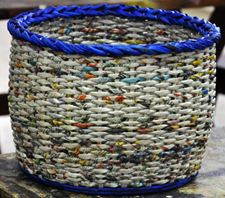Balaio
"I'm from Brazil and I'd like to send a song called 'Balaio'. It's an old dance from Rio Grande do Sul, a state in southern Brazil. 'Balaio' is a kind of basket made of straw or liana." -Bruna
The name of the dance comes from the shape the ladies' skirts takes during the dance: there's a point when they swirl and squat and get up, which makes the ample skirt take the shape of a wicker basket hanging from their waists.

Balaio
Wicker Basket
Folk Dance Song
Folk Dance Song
(Portuguese)
(English)
Eu queria ser balaio
balaio eu queria sê,
para andar dependurado
na cintura de você.
(Refrão)
Balaio, meu bem, balaio, sinhá,
balaio do coração
Moça que não tem balaio sinhá,
bota a costura no chão.
Eu queria ser balaio
na colheita da mandioca
para andar dependurado
na cintura das chinocas.
(Refrão)
Mandei fazer um balaio
Pra guardar meu algodão,
balaio saiu pequeno
Não quero balaio não.
(Refrão)
I wanted to be a wicker basket,
A wicker basket I wanted to be,
To go hanging
From your waist.
(Chorus)
Wicker basket, my dear, wicker basket, lady*
Wicker basket from my heart,
Girl** who has no wicker basket, lady
Puts her sewed clothes on the floor.
I wanted to be a wicker basket
In a manioc harvest
To go hanging
From the mixed-race girls' waists***.
(Chorus)
I ordered a wicker basket be made
To keep my cotton,
The wicker basket came out small,
I don't want a wicker basket, no.
(Chorus)
Notes
*Sinhá is the way the slavers called the ladies, it's a diminutive form of "senhora"(miss, lady).
**Moça is another name for a young woman.
***Chinocas: diminutive form of "chinas", mixed-race Brazilians. Bruna wrote, "The name 'chinoca' has a lot of meanings. The most common is a diminutive form of 'china', also called 'prenda'. Those girls with long dresses in the videos nowadays are all called chinas, chinocas or prendas (in my state we say prenda). They are the wives or girlfriends of the 'peão', both field workers. It's sometimes used in a pejorative sense, like a strumpet. Because these mixed-race girls were also companions of the soldiers during some wars."


Thanks!
Thanks!
Thanks!
Thanks and Acknowledgements
Many thanks to Bruna Marcela Benevenutti for contributing and translating the chorus of this song and for the commentary!
Obrigada!

























